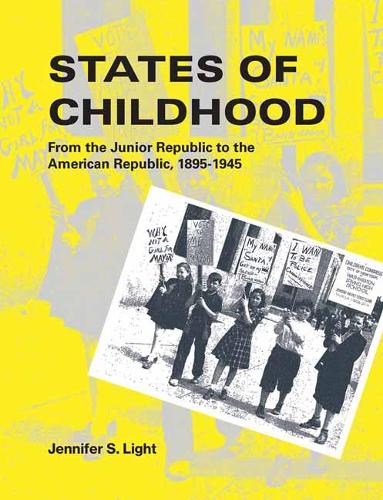
States of Childhood: From the Junior Republic to the American Republic, 1895-1945
(Paperback)
Publishing Details
States of Childhood: From the Junior Republic to the American Republic, 1895-1945
By (Author) Jennifer S. Light
MIT Press Ltd
MIT Press
20th October 2020
United States
Classifications
General
Non Fiction
Age groups: children
Labour / income economics
Social welfare, social policy and social services
362.732
Physical Properties
Paperback
472
Width 178mm, Height 229mm
Description
A number of curious communities sprang up across the United States in the late nineteenth and early twentieth century- simulated cities, states, and nations in which children played the roles of legislators, police officers, bankers, journalists, shopkeepers, and other adults A number of curious communities sprang up across the United States in the late nineteenth and early twentieth century- simulated cities, states, and nations in which children played the roles of legislators, police officers, bankers, journalists, shopkeepers, and other adults. They performed real work-passing laws, growing food, and constructing buildings, among other tasks-inside virtual worlds. In this book, Jennifer Light examines the phenomena of "junior republics" and argues that they marked the transition to a new kind of "sheltered" childhood for American youth. Banished from the labor force and public life, children inhabited worlds that mirrored the one they had left.Light describes the invention of junior republics as independent institutions and how they were later established at schools, on playgrounds, in housing projects, and on city streets, as public officials discovered children's role playing helped their bottom line. The junior republic movement aligned with cutting-edge developmental psychology and educational philosophy, and complemented the era's fascination with models and miniatures, shaping educational and recreational programs across the nation. Light's account of how earlier generations distinguished "real life" from role playing reveals a hidden history of child labor in America and offers insights into the deep roots of such contemporary concepts as gamification, play labor, and virtuality.
Reviews
"States of Childhood is a fascinating contribution to the history of childhood that makes us rethink young peoples role in the modern state. Throughout, Lights focus on dramaturgy, simulation, and performance in the model worlds of junior republics offers a brilliant perspective that will interest scholars in the humanities and social sciences alike."
Lynn Spigel, Frances Willard Professor of Screen Cultures, Northwestern University
"As we contemplate the pedagogical applications of virtual reality and the worldbuilding potential of generative models, Jennifer Light calls our attention to the 'junior republics' of the last century, where youth practiced being adults and served as a supplemental labor force for their municipalities. In this characteristically meticulous study, Light offers a fascinating genealogy of roleplaying and town planning."
Shannon Mattern, Professor of Anthropology, The New School
Author Bio
Jennifer S. Light is Director of the Program in Science, Technology, and Society at MIT, where she is Bern Dibner Professor of the History of Science and Technology and Professor of Urban Studies and Planning. She is also Senior Research Fellow at the Charles Babbage Institute at the University of Minnesota.
